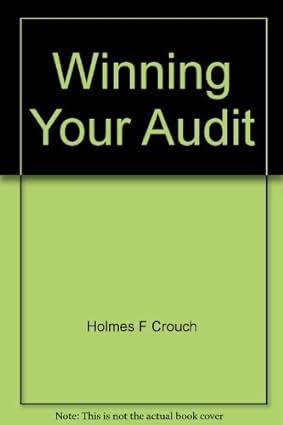Question
1. Supreme Corporation, an S Corporation, had accumulated earnings and profits of $100,000 at the beginning of 2019. Bryan and Fatima each own 50% of
1. Supreme Corporation, an S Corporation, had accumulated earnings and profits of $100,000 at the beginning of 2019. Bryan and Fatima each own 50% of the stock. Supreme does not make any distributions during 2019, but had $200,000 of ordinary income. In 2020, ordinary income was $100,000 and distributions were $100,000. What is Bryan's ordinary income for 2019? A) $0 B) $50,000 C) $100,000 D) $200,000
2. Identify which of the following statements is true.
A) Green Corporation, an S corporation, has gross receipts of $240,000; taxable income of $120,000; passive investment income of $100,000; and expenses directly attributable to the passive investment income of $20,000. The corporation's excess net passive income is $32,000.
B) The built-in gains tax applicable to S corporations can be avoided if the property is held for ten years.
C) An S corporation generally will not owe the built-in gains tax if the corporation has never been a C corporation.
D) All of the above are true.
3. Identify which of the following statements is false.
A) Jade is a shareholder in an S corporation. Her stock basis is $10,000 and her basis in a loan she made to the corporation is $3,000. Jade's share of the corporation's ordinary loss for the current year is $11,000. Ignoring the at-risk and passive activity limitations, Jade can deduct the loss in full.
B) A shareholder's S corporation stock basis will increase when the shareholder acts as guarantor on a corporate indebtedness.
C) A shareholder's ratable share of the S corporation's ordinary loss reduces the adjusted basis of his/her S corporation stock. Once the basis of the stock is reduced to zero, any loss-passthrough that remains reduces the basis of S corporation debts that are owed to the shareholder.
D) Debt basis is restored before stock basis.
4. Green Corporation, an S corporation, had accumulated earnings and profits of $100,000 at the beginning of 2018. Bryan and Fatima each own 50% of the stock and have a basis in their stock of $50,000 on January 1, 2018. Green does not make any distributions during 2018, but had $200,000 of ordinary income. In 2019, ordinary income was $100,000 and distributions were $100,000. What is Bryan's basis at January 1, 2020?
A) $100,000
B) $150,000
C) $200,000
D) $250,000
5. Jones Corporation was incorporated on January 1, 2010. The corporation made its S election on March 1, 2013. The corporation retains an E&P balance from its C corporation days. During the current year, it made a cash distribution to its sole shareholder Steven Jones. What is the proper sequence in reducing the corporate earnings accounts for the distribution?
A) AAA; E&P
B) AAA; OAA; E&P
C) E&P; AAA
D) AAA; PTI; E&P
6. Identify which of the following statements is true.
A) Fringe benefits limited by the more-than-2%-shareholder rule include stock options, group term life insurance premiums, and medical insurance premiums.
B) A shareholder owning 2% or more of an S corporation's stock, who is also an employee of the corporation, must include all statutory fringe benefits in gross income on his/her individual return.
C) Section 318 stock attribution rules are used to define 2% or more shareholders of S corporation's stock.
D) All of the above are false.
7. Which of the following items is not separately stated for an S corporation?
A) short-term capital gain
B) dividend income
C) Section 1245 income
D) charitable contribution
Please explain how you get the answers
Step by Step Solution
There are 3 Steps involved in it
Step: 1

Get Instant Access to Expert-Tailored Solutions
See step-by-step solutions with expert insights and AI powered tools for academic success
Step: 2

Step: 3

Ace Your Homework with AI
Get the answers you need in no time with our AI-driven, step-by-step assistance
Get Started


